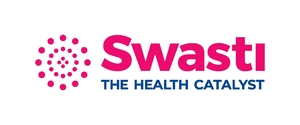


Swasti (Wellbeing in Sanskrit) is a Global South civil society organisation that is committed to adding 100 million ‘well’thy days for Vulnerable Communities. We bring the missing pieces of wellness together (mental, social, financial, environmental, systematic) to elevate the discourse from physical health to overall wellbeing. Our work encapsulates the definition of health by the WHO, and takes it further by bringing in more holistic perspective to the spirit of wellbeing. We integrate the technical/medical aspects with other aspects of wellbeing, with a strong focus on prevention and promotion.
Our work: Our success is in re-inventing systems to make it work for all, particularly for the vulnerable, following the spirit of the SDGs to "leave no one behind". Our multidisciplinary teams successfully 1) Demonstrate scalable, cost effective and sustainable models in partnership with communities, and 2) Support partners to reach impact.
Our work integrates and builds on policy-practise-policy, at sub-national, national, regional and international levels with a range of partners across impact organizations, bilateral, multilateral, government, foundations, academic and corporate bodies. To ensure the true spirit of wellbeing that includes all aspects of life (physical, social, mental, financial, environmental, and systemic), we have focussed on designing projects that include WaSH, Sexual Reproductive Health & Rights, Livelihoods related Skills Development, Social Protection, HIV/AIDS, Life Skills, Health Systems Strengthening, Issues faced by Migrants, etc.
Our flagship program, i4We (Invest for Wellness) specifically delivers well-being services to communities who have the greatest need for healthcare but are least likely to receive it. Delivered in four settings - urban, rural, factories, and within women in sex work collectives, the i4We model is tailored for the setting with further customization possible locally. We also support and nurture innovators, practitioners and technologists with solutions for achieving better health of the poor and vulnerable.